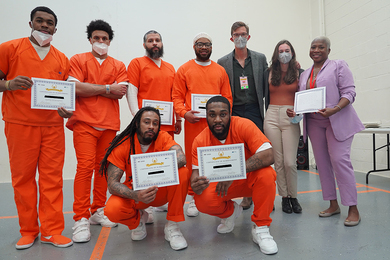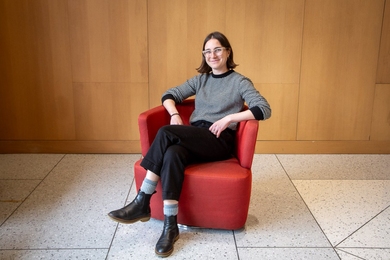Forty-six more members of the community have joined MIT's reengineering effort as it begins to redesign specific processes that will simplify administrative work, produce improved results at lower cost and make much work more satisfying.
Members of the first six redesign teams were announced last week by William R. Dickson, senior vice president and chair of the Reengineering Steering Committee and Professor James D. Bruce, vice president for information systems and reengineering program manager.
These teams will be addressing the appointment process, management reporting, supplier consolidation, information technology infrastructure readiness, information technology transformation and community involvement.
The teams' work will proceed through four stages: redesign, testing a prototype in a controlled environment, carrying out a pilot program in an actual Institute operation, and phased deployment across the Institute as appropriate.
"This framework," Professor Bruce said, "will allow for community input to the process, which is essential to its success. In both the prototype and pilot phases of the redesign, there will be opportunities for community members to review the team's ongoing work and to comment and make suggestions for improvements."
Professor Bruce also noted that each team will operate on its own schedule. "Some teams will complete parts of their redesigns this fall, with implementations beginning to be deployed as early as next spring."
Each team is headed by a captain and supported by a sponsor who is a vice president and member of the Reengineering Steering Committee. Most teams will also have outside consultants who bring expertise in the particular area.
Teams, their missions and memberships are:
APPOINTMENT PROCESS
One of the first groups to begin work is the Appointment Process team led by Stephen D. Scarano of the Office of the Vice President for Administration. Last winter he headed a committee that did an extensive analysis and redesign of the process of appointing academic staff. The Appointment Process team will build upon the earlier work to redesign the appointment process for all of the Institute's employment categories, including student employees.
Team members are Constance Cahill of Biology; Susan Cina, Kathleen Flynn, Esther Greaves, Mary Ann Howard, Cynthia Olson and Claire Paulding of the Personnel Office; Jean Dzengeleski of the Office of the Provost; Jacqueline Granville and Leslie West of the Plasma Fusion Center; Frances Helmstadter and Dana Bresse Keeth of the International Scholars' Office; Sheila Kanode of the Office of the Dean of Engineering; Nancy Kelly of the Office of the President; Fred Crowley and Kathleen Lalor of the Comptrollers Accounting Office (CAO); Susan Mannett of the Office of the Dean of Humanities and Social Sciences; Diane McLaughlin of the Office of the Dean of Architecture and Planning; Steve Neiterman of Distributed Computing and Network Services (DCNS); Evelyn Perez of the Office of the Dean of Science; Judith Rauchwager of Brain and Cognitive Sciences, and Carl Whitaker of Benefits Accounting.
Joan Rice, vice president of human resources, is the sponsor for the team. Working with them will be Pat Diaz, a business systems analyst from Bremmer Associates, a consulting group located in Cambridge.
The team is working in three groups. One is focusing on redesign of the appointment process for all employee categories and another on the development of a prototype to test the redesign, while the third will provide quality assurance for the entire process.
MANAGEMENT REPORTING
The Management Reporting team is led by Katherine Cochrane, special assistant to the senior vice president. The team is charged with devising a process that will deliver to each Institute manager the information-financial, personnel, property, space, etc.-needed to operate the manager's organization in an integrated, relevant, accurate and timely manner.
Team members are Donna Behmer of the Office of the Dean of the Sloan School; Laurence Connelly and William Huxley of CAO; Elizabeth Cooper of Physics; Shyamal Jajodia of the Audit Division; Stephen Kellogg of the Office of Laboratory Supplies; Wayne Turner of the Office of Financial Planning and Management, and Cynthia Vallino of Personnel.
Glenn Strehle, vice president for finance and treasurer is the team's sponsor and Ralph Lieberman from CSC Index is the consultant.
SUPPLIER CONSOLIDATION
With Diane Devlin of Purchasing as team captain and Mr. Dickson as sponsor, the Supplier Consolidation team will look at how MIT buys goods and services. The team's principal charge is to reduce the cost of goods and services acquired while improving the quality of service to the MIT community. Working with Ms. Devlin and Mr. Dickson are Peter Roden of DCNS and Kurt Sollod of CSC Index.
The Supplier Consolidation team will use strategies such as standardizing processes for acquiring goods and services, negotiating volume discounts and renegotiating existing contracts.
INFORMATION TECHNOLOGY
All of the reengineering teams will use information technology (I/T)-computing hardware and software-to help simplify work and improve service, but two of the teams will concentrate on computing.
The I/T Transformation (TRANS - I/T) team will look at changing how I/T specialists throughout MIT work together to operate and support the redesigned technology for administrative computing, help others use it, and add new features to it. With captain Marilyn McMillan of Information Systems the team aims to introduce methods and management practices for speedier delivery and support of useful, integrated, flexible business systems. Team members are Cecilia d'Oliveira of DCNS; Donald Nelson of the Plasma Fusion Center; Paul Page of Purchasing and Stores, and Pamela Phillips of Earth, Atmospheric and Planetary Sciences (EAPS).
The sponsor is Professor J. David Litster, vice president and dean for research. Frank Capek of CSC Index is the consultant.
The I/T Infrastructure Readiness team (R - READY) will implement the underlying computing software necessary to run the initial set of redesigned business applications both securely over the campus computer network and easily on computers at administrators' desks. Susan Minai-Azary of Administrative Systems Development (ASD) is the team captain. Team members are Jerry Isaacson of the Information Security Office; Steven Anders Oakland and Jeffrey Schiller of DCNS; James Repa of Operations and Systems; Scott Thorne of ASD, and Daniel Weir of Computing Support Services. Professor Bruce is the sponsor.
COMMUNITY INVOLVEMENT
A key team of the reengineering effort is the Community Involvement Team led by Isaac Colbert, associate dean of the Graduate School. Bill Hecht, executive vice president of the Alumni Association, and Barbara Stowe, vice president for resource development, are team sponsors. Pam Phillips of EAPS, Karen Temkin and Lisa Hirsh of CSC Index are team members. Robert Jaffe, chair of the faculty will serve as a faculty advisor to this team. The Community Involvement team is charged with helping the Institute community understand the need for simplifying administrative processes, and soliciting and incorporating the views, ideas and direct participation of faculty, students and staff in the reengineering effort.
Given the very heavy time commitment needed for participation in the reengineering effort, it is difficult for faculty and students to be full team members. However, other mechanisms for participation such as serving as an consultant to a team, being a member of a team advisory group of participating in a team focus group,exist.
Gathering community input is one of the main tasks of the Community Involvement team. The team will work with faculty, students and staff to assure input. This group will arrange events to keep reengineering progress visible as well as schedule update meetings with various groups and individuals on campus.
In addition, the team invites members of the Institute community to communicate with it by sending electronic mail to workout@mit.edu (this mail is anonymous) or by leaving voice mail at x2-1700.
A version of this article appeared in the September 21, 1994 issue of MIT Tech Talk (Volume 39, Number 5).





